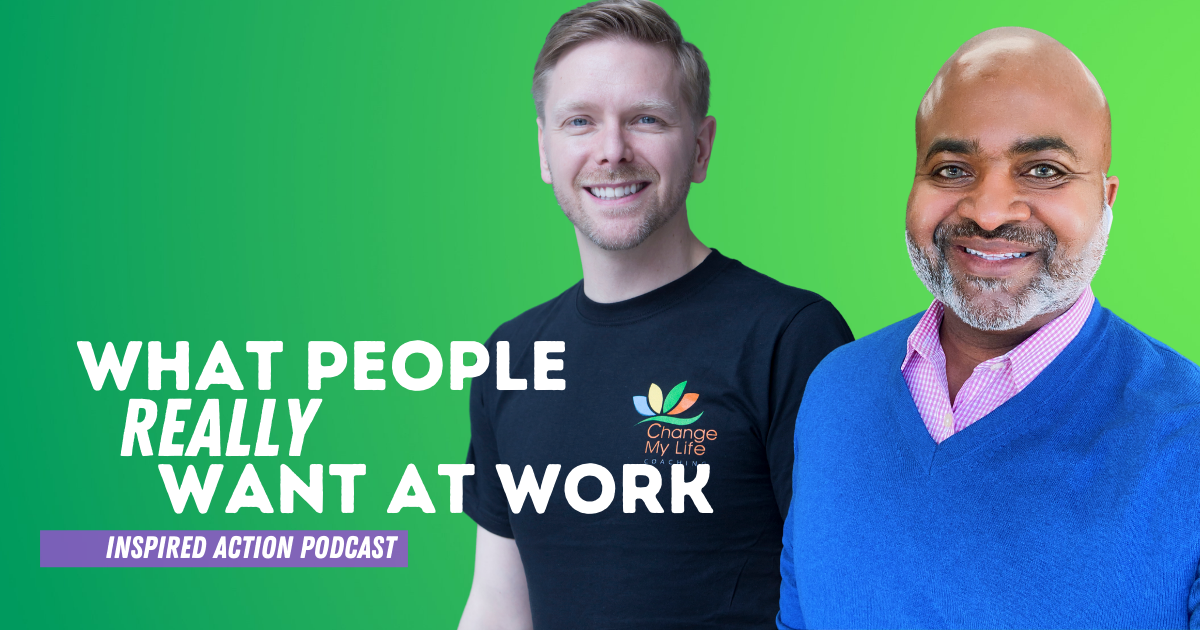“What People Really Want At Work” Brief Summary:
What is it that you value in the workplace? Do you value team work? Do you value money? Overtime? Work-life balance? In this Inspired Action For Imperfect Humans Podcast episode, hosts Christopher Lawrence and Kyle Kalloo, discuss what is valued in the workplace in 2022, what will be valued post-pandemic, and why it’s important for leaders to adapt to the workers needs.
“Work-life balance is not sustainable anywhere. It’s just physics. It’s not sustainable psychologically or in the workplace”
Summary:
- Introduction
- Is cash king?
- Why a hybrid approach to work is the best
- What people really value in the workplace.
- Why it’s important for the leader to adapt to the workers need.
- Christopher tells a story about a previous job in the oil and gas sector
Calls to Action:
Even before the remote workforce evolution, office culture was inherently fragile. After all, it’s made up of imperfect humans interacting with other imperfect humans. And while perfection isn’t the goal, we all secretly wish for a workplace where people find ways to bring out the best in each other. Unfortunately, that’s not always an intuitive skill. It takes guidance, practice, and then more guidance and practice… but with the right leadership, it’s definitely achievable. How do you enhance your workforce’s ability to engage, collaborate, and adapt in this volatile and uncertain reality? Get the answers to your culture questions when you setup a complimentary Discovery Session with Kyle Kalloo at https://ChangeMyLifeCoaching.as.me/?appointmentType=14623413
Not loving your career? Feel you need a change in your job? Let’s Strategize! Book a complimentary Strategy Session with Christopher Lawrence here: https://ChangeMyLifeCoaching.as.me/?appointmentType=14044176
Tell us your “inspired stories” stories by visiting www.InspiredActionPodcast.ca
Christopher Lawrence LinkedIn: https://www.linkedin.com/in/career-life-coach-christopher-lawrence/
Kyle Kalloo LinkedIn: https://www.linkedin.com/in/kyle-kalloo/
Change My Life Coaching & Change My Business Coaching LinkedIn: https://www.linkedin.com/company/6446498/admin/
Looking to create a corporate coaching culture? Reach out to Kyle Kalloo: [email protected]
Website: https://strategicleader.ca
“What People Really Want At Work” Transcript:
[00:00:00] Well, we want, we want work life balance and it’s like, people don’t balance is not sustainable anywhere. It’s just physics. So it’s not, it’s not sustainable psychologically or in the workplace, either the thought of being imperfect, keeping you from taking action. Welcome to inspired action for imperfect humans.
Each week, we give you real life stories and thought provoking research that inspires your soul to live a more fulfilled life through your own actions from the heart of Calgary, Canada. Here are your hosts. Award-winning coaches, Christopher Lawrence in Kyle Kalloo. How do you feel? Oh, I’m sorry. This is, I thought I was starting you.
No, like you said, I know you started, so, okay. How are we even friends? Like.
The most caring and thought-provoking and generous. And you’ve been looking for, thank you so much for the compliments. [00:01:00] I wish I could say the same ladies and gentlemen, another news. This is what you have to learn, how to move forward, because if you get stuck in those places, here’s, what’s going to happen to you.
Welcome to the ladies and gentlemen, do we just say y’all are folks, folks, everybody, everybody, all genders. Genders everything. So you’re not left to say ladies and gentlemen anymore. Got it. Called the gentlemen though. So is that my preference in my gentle about you so life to be called gentleman, but there is nothing gentle about it.
Welcome to another exciting week. I really. Uh, topic actually. Um, but listen, if you have not downloaded, shared our podcasts, given us feedback, what are you doing member? The goal is 10,000 download this year. Uh, we’re a few thousands away. However, I really believe you can help us out. So, [00:02:00] uh, if you haven’t done, so make sure you given like or comment.
And that’s the other thing too. Apparently that’s the currency on these types of podcasts is people have to comment on it. Give a rating review and all that other stuff. So if you feel it’s a five-star rating, definitely do that. Whatever device you’re using. Definitely do that. If it’s not a five-star rating, why are you listening?
What are you doing here? Right. We want to hear it. I know, it’d be interesting to hear some of your comments as well as then. We can, we can comment on those comments. No. Okay. Interesting. Last week, did we not get quite a few comments on that? Like last week alone, random people all over, even a two, I think, or you got two clients.
I know I got one where, um, they said I’ve been listening to your podcast for a while, and that was what took me to decide to work with you. One-to-one because that’s going to listen to the podcast for a year and a half, and then finally decided to reach out. Okay. Interesting. Yeah, that’s [00:03:00]really cool. Yeah.
That says something about their values too. Right? Just what it is, the information that they’re getting and all this other stuff, which brings us to today’s subject is more round. What is it that you value in the workplace? Well, I, you know what, it’s interesting actually, because. And we’re, we’re headed into an interesting time, right?

So, so there’s labor shortages. That’s going to continue for a very long time. Um, it’s what they expect here in Canada. And certainly governments and stuff will do things to fix, but gearing those, like once stuff like that happens, it takes a long time to gear it up to, to have resolution. So they’re looking at about 10 years of rolling labor shortages in various sectors.
Yeah, 10 years score. We only have nine and a half left, so here’s the thing. There’s so much focus on the dollar amount. And I think that that actually we’re dealing because we are kind of in this, in this [00:04:00] COVID merging into post COVID ish, I don’t know, depends on the day in which locale you’re in and you know who your health authority is.
But, um, I think. Learning to value things differently. So, so certainly, you know, dollars are king in a lot of people’s minds, right? They believe that dollars will increase satisfaction, but this is really important because actually called, do you know what the satisfaction timeline is? Uh, after somebody gets an increase, do you know how long they feel satisfied on average after that?
Um, I’m thinking maybe a year, year and a half, try six weeks, six weeks, six weeks an increase on average. So some would be more, some would be less, uh, the satisfaction that you got from that, that enjoyment, the satisfaction, that kind of glow that you had from, from being in the room, getting the raise um, Has gone away.
So, so [00:05:00] it’s interesting. Like I remember being in this place when I was a young person where, where cash was king, right. Where it was just like, you wanted more money, you wanted more money, you wanted more money and you measured everything by your money. And sometimes you would mature into, but what’s the whole benefits package look like.
And, and, uh, do you remember that? Do you have times like that Kyle, like where you were, there was a dollar focus. Yeah, cause there’s a, you know, one in earlier in my career, the reason why that dollar amount was important is because every time you need credit or need to buy something, they kept asking about your salary.
And they’re like, oh, well, if you’re making this money, this amount and up that we could approve that. Really. So I knew in the beginning I was driven by, it had to be a certain number. Right. And then it later on became other things that I valued, you know, um, financial freedom to do, you know, buy things, right.
To take care of other people in my network. Uh, travel. Is where those things came up. Right? So I think you’re bridging into this as like, [00:06:00] what do, what people really value about work. And I think that the definition of that has changed significantly since pandemic. Like there are organizations who are not looking at doing a hybrid approach post pandemic.

Can I understand for certain roles why that’s important, but there’s lots of rules. Where it’s easy and actually better for an organization to do that. But there’s some old school organizations here. We are in Calgary, Alberta organizations that have been around there. You know, whether it be oil or transportation or, or whatever that are saying, no, we’re not going to do that.
And it’s just like, you will not be able to compete. So, so this is it. This is exactly it. So I wanted to cover some of the things that. That people really value in the workplace. And as we go through this, I want you, the listeners. To be thinking about what you really value. Do you agree with these for yourself?
Do you not agree with these for yourself? It’s just a checklist [00:07:00] and, and, and there will be things that we don’t cover on here, but I want you to think about this because this is what your ask needs to be. And employers are going to have to learn to take an individualized approach. I’m sorry. This whole approach of like, well, we want w we want work-life balance and it’s like, people don’t balance.
Is not sustainable anywhere it’s just physics. So it’s not, it’s not sustainable psychologically or in the workplace either. I don’t believe in work-life balance. I believe in work-life flow. It sounds like Symantec, but they’re very different. Work-life flow is that sometimes work is going to get more and sometimes life’s going to get more, although work seems to get more doesn’t it.
And for a lot of people and it’s like, okay, so where does it balance out? Um, some people really value overtime. Some people don’t, it’s not even worth it to them. So. I don’t value over time, even if I was being paid time and a half or double time, it’s not important to me. So, so we’re going to go through this and I want folks to be thinking about what they value and Kyle, I encourage you to [00:08:00] chime in, if you have something intelligent to say, so you might hear from Kyle on the next podcast.
Uh, I was, uh, folks, you know, I know people noticed enough to pick up on that. Like, those are subtle things that I would do, and I know they know enough now to say, Yeah.
Oh, I’d like to say, sorry, but that would be a lie. Um,
so, so here’s, here’s some of what people actually value in the workplace. So certainly post pandemic people are valuing a hybrid approach. People want an opportunity to work in the office and work from home. Right. They want to work in the workplace and they want to work from home. And you haven’t seen some postings that’s like that now.
I’m not sure, totally remote remote work. And it even uses the word hybrid. And some of them have said, listen, you’ll always have an office. Well, whenever you want to [00:09:00] come in. Totally. Yeah, totally. So people want to enjoy a good work environment. So of course this means that it’s not a contentious environment.

I think a lot of leaders don’t recognize, um, and this would be more senior leaders, uh, executive level. They don’t recognize when they’re, when they have a toxic working environment. It’s amazing to me. To hear how surprised there, which also tells me that they’re not having the conversations and they’re not encouraging those conversations.
People also value hearing from their boss in a good working environment. They need their boss to own their mistakes, to apologize when they make mistakes, they need their employees to apologize when mistakes are made and mistakes need to be non-punitive. But educational, what do you mean by non-punitive?
I mean, I know what you mean, but. For everyone else listening. What do you think what happened? Because they worked so closely with you. I don’t have good examples of it because constantly punitive to you. Um, so maybe [00:10:00] you could define it for the fun, you know, when people usually when there’s a situation that.
I’m going to admit something to it, right. To say, listen, I forgot to do this. And you know, there’s a situation that happened that, um, you know, as I think about it was punitive. So, you know, there’s something as we’re transitioning to different pieces. Cause right now with everything’s happening, there are days that we have a hybrid approach.
So people have to work from home when people come and work in the office. Right. However, there was a situation where I said, you sound like Sarah Palen, you just set up. The stuff that doesn’t even make sense. Can you start that over? Hold on, let me get there be patient. Um, so what happened this morning is I said to someone on our team, you know what?
And they said, Hey, I didn’t get this thing set up. And I’m like, oh man, this is why I asked you two weeks ago to get this thing set up so that we don’t have to be in the situation that was punitive. Right because now the person, when they admit that they didn’t do it, I made it punitive by saying, see, this is why I talked to you about it.
It feels guilty. I’m making them feel guilty. Right. And [00:11:00] just an apology on the tip of your child. Totally. And I will be doing that as soon as we finish this today. Right. And so that was punitive instead of saying. For whatever reason you didn’t get to it. We’re getting to it now. So let’s solve it right now, right?

That is be non-punitive right. We’re not saying, you know, this is what I mean. I was just frustrated in that moment, but instead of thinking it through, or just taking a moment, because I felt the frustration instead of taking that moment. I made a period by saying, this is why we talked about getting this set up.
Right. So when people admit their mistakes or meant something to you that, you know, we could go office as well. You know, if this should have coulda, woulda, that’s not the moment that matter. Right. It doesn’t matter in that moment. You’re dealing with it. If they’d come back to it, that’s different. It would be better deal with it in the moment, get this situation resolved and then have a reflection.
How obviously you have prevented this. Exactly. Could we do to prevent this in the future? Because in that moment they may not be feeling that good about it. They may feel a way [00:12:00] about admitting it to you. You know, it’s, it’s hard for people to admit their mistakes, Christopher Lawrence, right? So there’s times where I was first on the lips to admit actually that’s true, but I just needed a jab in.
Oh, I’d like to get this guy to acknowledge that it, that something was a mistake. It’s like, it’s like pulling teeth and I’m not even a dentist, but girl, try not true. Anyway. So I think that’s what we’re saying. When you hear about non-punitive, that’s what we’re saying is don’t make it punitive. Don’t make it that they feel already bad about it.
Just move through it, because then that way you’re letting them know that it’s okay to actually say those things, right. That that is still a safe space. So I just wanted that. Clarity when we talk about non-punitive. So as you’re kind of leading into this, Kyle, actually some of, some of the other things that come up on this list of, of what people value is to be taken into an account as an employee.
And this is, this is so important, like these broad brush stroke pro [00:13:00] programs of like employee retention. If you want to, if you want to increase employee retention, you need to talk to the employee and ask them, what is it going to, what is it going to. You know, what’s it gonna take to keep you here? What, you’re a good person, right?
This is also known as like emotional salary or social benefits of, of the thing that might my problem with this is that they, you know, and, and this is where big organizations need to take a page. There was an organization. I think it was the people that make, um, was it Teflon or tiebacks or something like this, that for a while.
And I don’t know if they still do this, no office, no factory was allowed to have more than 250 employees. Once that happened. They had to split if they grew that big. So they allowed each, each organization to be on a first name basis and they were allowed to adapt their policies and cultures. The way that that particular unit wanted to that is a much better approach to take because each one will have its own social culture.
When you [00:14:00] are, when you are thousands of employees. Even if you go survey your employees, they’re going to try and broad brush stroke and they know not all organizations can do this. I know that, right. Like if you’re, you know, airline, as an example, if you have 5,000 flight attendants, it’s going to be really hard to, you know, you can’t break into smaller chunks, really.

Like, I just don’t see how that model would work. But the point I’m making is that when you, it starts to get watered down and it’s like, well, this is what our employees want. And it’s like talk to anybody in a union. And that’s how you want some of what we’ve got. I’ve liked. And a lot of what we’ve got, I don’t, and, and of course, it’s it’s to the agenda of the person who’s been elected as the union leaders.
Right. I th I think when and where we can, we actually need to kind of say, what is it for this employee? That’s going to make it work. Some people are like unlimited vacation. And I was like, yeah, I want that. And I think the majority of people would say that, but when you understand the unlimited vacation usually means the employee, the employer benefits, you get more from an employee [00:15:00] on unlimited vacation than the employee.
Because they end up working on vacation. They don’t always take their time, blah, blah, blah, blah, blah. The whole bit. Some people are good with that. Right? Like, I’m good with that. It’s like, because I know how to manage it, but there are some people who are totally lost in that. Right. They’re like, no, tell me it’s nine to five and three weeks vacation.
Right? Right. And so you have to kind of look at the employee side. This is the importance of having that kind of middle leadership really well-trained and giving them the opportunity and authority to develop their leadership skills and actually work on their teams and with their teams, not task saturated, where it’s just like shit rolls downhill.
And they’re the one that. The brunt of it. So people want to be taken into account as an employee and they want the employer to have the ability to adapt to the workers needs girl. I don’t know how many people I’ve talked to that feel guilty taking a sick day. Absolutely. And before you say, or a pill and the rest of it, cause he talks about [00:16:00] me so appealing, but easy to keep going.
Right. Because there’s so much we want to talk back here. Uh, I just want to go back to a little bit of what you said about the engagement and taking them to account leaders and others. You need to know that these things change. Right. So just because I told you two years ago, That money was important to me doesn’t mean money’s important to me today, right?
So we still need to, that’s why it’s a constant thing is going back and forth. And just being able to being able to say, this is what needs to happen. So take, take into account that these things change, why the conversation needs to be ongoing. Let me tell you why he’s laughing. Okay. Cause he always grills me.
Here’s the thing I’m responsible for setting up the podcast. I’m responsible for the timer, I’m responsible for everything. And then, and then when I, when I’m talking, like he could give me the grace of walking me through, you know, of telling me how much time we ever, whatever. And he, on these podcasts, he always, I always kind of give this wrap.
Signal cause we need to move to the end of the [00:17:00] podcast. So this time I gave him a five minute signal because I had the opportunity to look at the timer because it wasn’t my turn to talk. And this bitch turns around and fucking starts laughing at me because I gave him a five minutes ago. So girl, I’ll tell you what you are now responsible for watching the timer moving from
When I’m talking, why can’t you look at the time when he’s talking? That’s why I’m laughing because he’s always watching the time when I’m talking, but when he Sarah Palin it, uh, he likes to look at the top. Hey, you brought up her name anyway. It’s cause I started clipping for this morning on, about being a feminist.
You’re not a FA like, like you are not, you don’t support abortion rights. You’re not a feminist. What? Like you, can’t what, that’s another show, that’s another show, you know, and it’s not, if it doesn’t belong in this podcast, but anyway, she was rambling on like, it’s like word salad, girl. Just kind of throw everything in and okay.

So, so of [00:18:00] course people, we want our leaders, uh, to adapt to the worker’s needs. We want the organization. To adapt to the worker’s needs. It’s kind of building off what Kyle said sometimes. You know? So sometimes it’s like, look like I didn’t have kids a year and a half ago. I have kids now. Right. That, that, that is now a lifestyle change.
I need you to adapt to me. Okay. Uh, also you look at like mental health changes in people in the last two years than certainly it existed before, but this has brought it to the limelight. I, I feel like it’s like, look two years ago. I wasn’t working from home by myself. I’m struggling with fear about getting sick and dying, you know, and, and now I am, so I need, I need some grace.
Right. So, so I think it’s important. That organizations understand this, um, flexibility in time. People want to have more say over when they’re working. I do think that if you look at the research, that’s coming out about a four day workweek, most organizations, if possible, should adopt a four [00:19:00] day work week as a full-time standard, as opposed to three days.
And if you actually look at what productivity is, I actually think that we should shorten the Workday too. I think we shouldn’t be between. Six to eight hours, not this like eight hours, but you get a one hour lunch. So it ends up being a nine hour day anyway. Yeah. Do you know actually what the research says about how productive, the amount of the, how long someone in a typical days productive in an eight hour shift?
Probably five and a half hours by. Two hours and 53 minutes, girl, these people are not entrepreneurs. Isn’t that crazy? Like almost three hours. And so when you’re doing an eight hour or 12 hour or 16 hour, what do you really get? Right. Totally, totally agreed. Of course there is a salary thing. People do want benefits and they do want a good salary, but I think what’s defined as a good salary, uh, is, is subject to definition.
I think exactly. I think it’s actually, you know, like if I [00:20:00] look at it, here’s what I would do if I was an organization and this is totally biased, I would hire several coaches. So if I couldn’t actually pay a whole bunch more to my employees, I would actually have. Coaches to help them learn to live with what they have and still a T and still achieve their goals.
So you want to buy a house if we pay you more, how do we get you there? Because there are people on your salary who do own a house, right? So w or whatever it might be, of course we want good leadership. So that’s giving our leaders the opportunity to really become good leaders. Um, People want to work towards something meaningful.

They want to have a goal they want to have, um, they wanna know that they’re contributing to something that matters. I’m sorry, I I’m going to blast one of the previous organizations. I hate name dropping budding in a name drop because I’m trying to help them out. Uh, just, just on this podcast, they have nothing.
They are not affiliated with us in any way. When I worked at TransCanada. Uh, which has no TC energy. They had a C, they had a, um, their [00:21:00] KPAs, KPIs, and, um, and corporate vision and mission. And I could not even understand the KPIs. What does this mean? And how do I help the company make money? Where do I make a difference here?
Right. And, and it was so interesting. So, so HR at some point decides to roll out this corporate scorecard where, where we can pin it up on our board and we’ll. We’ll get an updated report card every quarter. Um, as part of our KPIs that we can talk away and see how we’re doing as an organization. This was their attempt at getting people to connect better with the organizations, um, KPIs, you know what the issue is, unless you were an engineer, you couldn’t understand the KPIs unless you were in their business development.
You couldn’t understand the KPIs. I was in their PMO, right. I was in their project management office and it was like, I don’t even know what this means. Like I don’t, I don’t understand. So I go and ask my leader. I said, [00:22:00] how do I help the company? And how do I help the company make money? And she said, I don’t know.
And, and she is a smart woman, like she’s a smart woman and she couldn’t answer the question. She said, go ask this person. So I go ask this person and I got the longest diatribe of something else. I didn’t understand. It was, it was like crazy. It’s like, you have to be walked out, more confused. That’s it. So, and I think, you know, companies have values and I think values are important for companies to have, but the truth is, is that there’s no accountability held to those values in most organizations.

What people really want is to know what their values are and, and making sure that they can execute on their values within the role that they have or in the organization. So I think, I think Kyle this should give people a lot to think about. Folks your, I want your imperfect inspired action to be this.
I want you to understand what you value about the workplace. And don’t give me some bullshit, diatribe of like hard worker work [00:23:00] ethic. That doesn’t mean anything. Define what that means for you. Define what it means for you. What I talk when I look at my dad who had incredible work ethic, who gave so much to his come to, to the organization he worked for and.
I had months and months of overtime and vacation and sick time built up because it was a unionized environment that he was never able to take before retirement. They, they chewed him up and spit him out. And that was baby boomer work ethic. He did what was required by the organization because it was the right thing to do period, conversation over.
But the organization did not end up valuing it in the end. They took advantage of it. So I think you need to get real clear and I’m not saying old school work ethic is dead. What I mean. We need to get real clear on what those values are for you kind of find me if you don’t know, you’re not going to be able to ask him.
You said that another podcast, right? You gotta be really clear for the ask and because listen, the leader’s not sitting there thinking it [00:24:00] all out for yourself. Now we will be doing another. Podcasts on the great resignation, because I think this is going to play into some of those things. I, we have some interesting stats that we want to share with you around.
Here’s why people are walking out, right. Here’s why people, why they’re not, they’re leaving your industry. Come back and definitely listen to that, uh, and share that with other people we’ll talk to you next week. Take care everybody. It’s our goal to build a global community of inspired action takers, and we can only do that with your help.
So if you love inspired action, please leave a review on your favorite podcasting app and share us on your socials you’ve heard from us. Now we want to hear from you go to inspiredactionpodcast.ca and tell us what is the inspired action you took this week, next week on inspired action for imperfect humans, you can do all sorts of things.
And there is no guarantee of success and people should know that first and foremost, [00:25:00] like do not think because you manifest it because you pray because you work hard, hard work doesn’t even necessarily lead to success.



